#chambers and fogg
Text

*trips and another fiction podcast falls out of my pocket*
hello, it is I, Lauren Shippen, maker of many audio dramas, including the daily @breakerwhiskey. after having so much fun doing that podcast every weekday, I thought "what would be the opposite of doing a daily podcast?" and here we are, with a yearly one. New Year's Day is a yearly podcast about what to make of your life when you live forever and is a collaboration between me and my dear friends Andrew Nowak and Briggon Snow (who you may know from @thebrightsessions). here's the elevator pitch:
Every thirteen years, two old rivals meet on New Year’s Day to discuss their lives in the intervening decade. They lead separate lives but share one earth-shattering secret: they’re both immortal.
new episodes will come out every january 1st - for this first jan 1, we released 3 episodes, so that the main story could get underway, but moving forward it will be only one a year! which is a real change for me obviously! and will certainly be an interesting challenge from a storytelling and audience building standpoint.
on a personal note, this show is a continuation of what I've been trying to do with @breakerwhiskey and what I hope to do with @maxinemilespod later this year, which is to independently produce fiction podcasts. I could go on and on about how tough 2023 was on audio drama - and independent art in general - but suffice to say, having a career as an independent artist is hard. we're making this show - as with @breakerwhiskey - for the sheer love of it, and we hope you love it too.
happy new year!
#the bright sessions#mark bryant#caleb michaels#lauren shippen#briggon snow#andrew nowak#audio drama#new year's day podcast#atypical artists#chambers and fogg
201 notes
·
View notes
Text
June 4th, 1920
My dear Mr. Chambers,
Apologies first and foremost, or taking such a godawful-ly long time to return to return your letter of the fourteenth of April. Once again, you prove yourself to be an endlessly thoughtful and fastidious person. I feel in utter shambles next to you so often. But with a bright new shining decade at our disposal, I’m determined to be more organized.
An auspicious start, isn’t it? Diving fully into the new decade halfway through its first year. But I’m only just back from my post-war jaunt around the globe—a trip well-earned, I’d say—and I’ve purchased an absolutely absurd estate on Long Island. More rooms and more land than I know what to do with, but I’m sure I’ll find ways of filling it all. After so many years being a respectable, responsible middle aged man, I think I’m due for some foolishness.
To kick it all off—my triumphant return home, the sparkling nineteen-twenties, my extravagant purchase—I’ve decided to throw the party of this, and any, season. On June 21st, I’ll be hosting an enormous fête for the summer solstice, an occasion I’ve never given much thought to, but which is celebrated all around the world with great aplomb. There will be dancing and eating and libations, both legal and otherwise, and I do think it will be a rollicking good time.
I would like to have you there. In truth, I’m not certain who will be on the guest list. It’s tricky, isn’t it? Just as you predicted, making and maintaining connection over the decades when we appear the way we do is quite difficult. And with the war and being away for so long after, my social circles have dwindled severely. I’m thinking of inviting my brothers and sister for God’s sake, so please come save my poor dulled soul.
I know we haven’t seen each other in some time, but there would be something poetic, I think, in meeting again at the halfway point of the year. I had toyed with the idea of hosting a New Year’s Eve party instead, but the holiday is now so wrapped up in time spent—
Say you’ll come. You can stay the weekend, the week, the month. Just say you’ll come. For now, I am,
Humbly Yours,
John
[a letter received by C.X. Chambers]
[to read more of the pre-1917 entries, join Atypical Artists and get access to the archive of 24 entries (5,000+ words), as well as ad-free episodes. to receive future monthly missives straight to your inbox, sign up for free here]
12 notes
·
View notes
Text
Undead Girl Murder Farce Episode 6: The Phantom Thief and The Detective
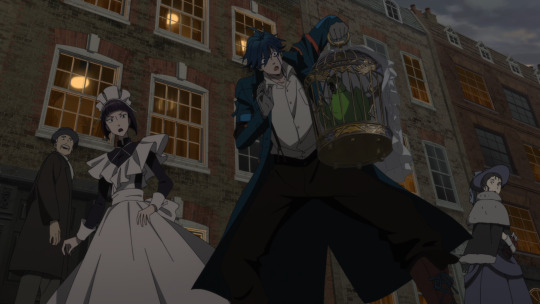
Forget aging like fine wine, Undead Girl Murder Farce is evolving right in front of our eyes. With each step, each frame it changes shape and form, molding itself into what it desires in that exact moment. Transitioning from comedy to cunning, creativity to combat at the drop of a hat and making it an effortless transformation at that. An endlessly impressive feat that only grows in ability and nature as time marches onward. I absolutely can't get enough of it.
I mean, they start the episode with Tsugaru and Shizuku misplacing Aya's head. The detective that's supposed to go toe-to-toe with the greats of France and England respectively is accidentally replaced by a parrot of all things. I feel like I have to scream from the rooftops how much I love this idea.
First and foremost, this is a farce.
It is a failure, a comically dumb mistake. And it's an expert idea. It embodies the nature of the characters, the fact that they're meant to be silly and weird and that they could never measure up to Holmes or Lupin in a battle (whether it be of brain, or brawn like we see later in the episode). I just love it. Aosaki completely sells out his characters in the mockery that he so desires. I'll say it one more time, I just love it. It's not cunning that brings the Cage User into contact with the Phantom Thief and Phantom of The Opera, it is pure chance due to the severity of their slipup. It's just so good.
Anyways, to Holmes and Lupin first. I loved this a lot as well, quite a lot, really. The idea of the two minds challenging one another so brazenly is such a fun idea, and I love how they do it.
Even better than that is that they don't hide anything from viewers. Right away (well on the first close up), you can see that "Sherlock's" eyes are a different color and feature a different style of pupil. Rather than the blue with rings that he usually sports, it's the plain yellow irises that denote Lupin's that are in his place.
Such a great and simple detail that I'm sure many could have easily missed. Another great piece was Watson's comment on the security of Fogg's mansion, which Lupin downplays. Sherlock made a disparate comment prior to that, which Lupin wouldn't have known about, so Watson is momentarily confused before Lupin steers the conversation away from it.
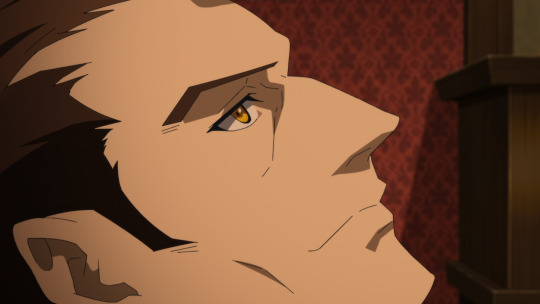
Also, super cool that Mycroft Holmes makes an appearance in the episode to immediately draw the curtain on Lupin's disguise. While he states it's the fingernails of Holmes (which are different than the prior episode, and are in line with Lupin's fingernails), I feel like another giveaway would be how Lupin refers to Mycroft. Though it's not like we have any way of confirming.
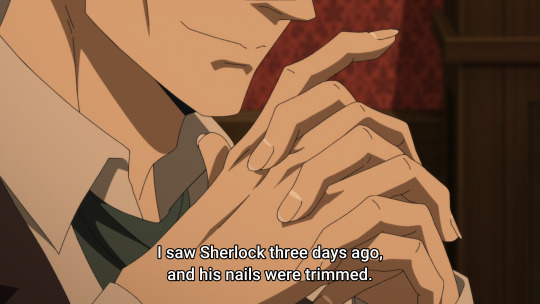
Moving on, this line in particular was an amazing tipoff to viewers as to what it was that Lupin was doing with his visit to Holmes.
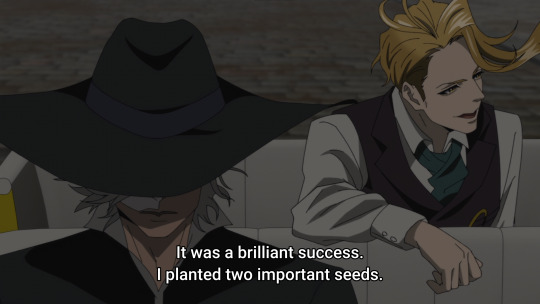
Allow me to explain. There's two specific things that Lupin did during his visit that are fundamental to how both he and Sherlock Holmes approach this burglary.
One: The disguise. Lupin asserts the fact that he is a master of disguise, someone that can effortlessly mimic the presence and character of another person, that he can blend in with those around him.
Two: The lock. He shows to Holmes how easily he can open and intrude on the safety that a lock is meant to provide. That he can effortlessly access anything that is designed to keep him out.
So, what's the purpose of showing his hand? To provide misdirection. Lupin was never the one that was going to steal the Penultimate Night, it was Erik. Erik, who can blend into a crowd without a disguise. Erik, who is far more flexible and fluid than Lupin and can expose other ways to enter the Chamber of Additional Crimes. It's an incredible setup on a one-two punch that sees Lupin use the blistering intellect of Holmes against himself, and I think it's an incredibly good piece.
Arguably even better than that though is our trio coming into contact with them. As I said earlier, it was sheer chance, but they immediately use it to their benefit by encouraging a response from Lupin that gets him to expose his nature to Tsugaru in a fight. It's really, really, really great that they play Lupin exactly as Lupin played Holmes. Such an interesting relationship. Anyways, here's the fight with impressive choreography, color, conversation, and combat. Just entirely impeccable work that provides a style decidedly different (might I also add once more here) to all of our fight scenes to date.
And the icing on the cake? The sound of the Kabuki clappers, alongside the toll of Big Ben. The signal that tonight's farce has begun. I love the inclusion of this idea. Such a great auditory addition.

Oh, and I forgot to mention, Mycroft mentions Baritsu by name??? As in, the form of martial arts that was created by Sherlock Holmes in an Arthur Conan Doyle novel?? Incredibly cool to see how much detail Aosaki's put into the lives of infamous characters like these.
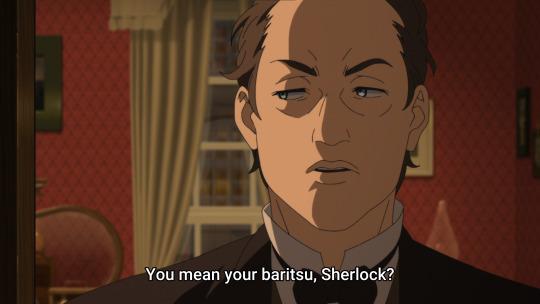
Of course, a story featuring Holmes and Watson and that whole entourage would feel imbalanced if Lupin didn't have his "buddy" appear as well. That is, the inspector Ganimard who is as close to Lupin's nemesis as you may reach. I should also add that the existence of Ganimard in this story makes the question of what it is that Lupin stole from the box even more interesting.
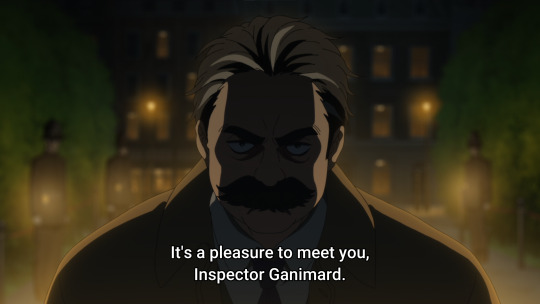
Anyways, the night begins, the detectives take their place in the Chamber of Additional Crimes. Aside from our trio of Aya, Shizuku, and Tsugaru. An interesting exclusion, but immediately we understand why.
An intruder appears from the North building, putting everyone on red alert. Holmes, of course, knows this is simply part of the play that Lupin's enacted, so he takes the necessary steps to ensure the curtains fall early on his performance. By shooting shut the doors.
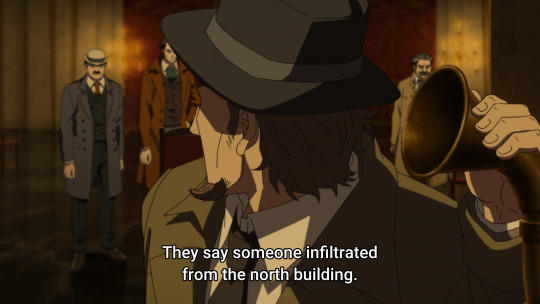
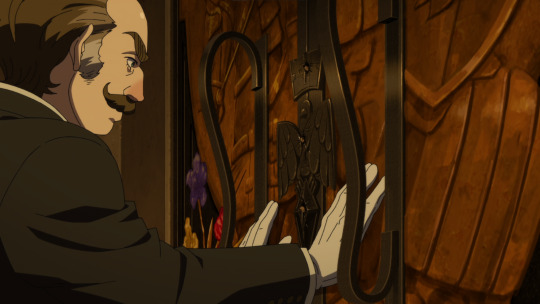
From one chance meeting, and a single sentence relayed to the chamber, Lupin is able to trap his prey effortlessly. And from there, it's a race against time as water floods the chamber.
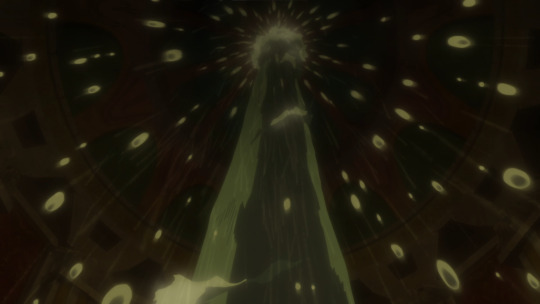
This episode seriously went by in the blink of an eye. The story and characters played their roles so perfectly that I was hardly paying attention to storyboarding or direction. It all meshed so effortlessly that it's near impossible to isolate one from the other. The storyboarding is influenced by the content of the episode, and is a reflection of that. They're two halves of a whole that are incomplete without one another, missing details and information that render our farce a failure instead.
I absolutely cannot wait to see what happens with the next episode as Lupin faces off against the "insurance" agency and our cage user. Insanely curious to see if he bares his fangs towards either, and if we get any confirmation of Erik's true nature (if there is one). Time and time again, Undead Girl Murder Farce delivers the episode of the week as if it was simply another Wednesday.
#undead girl murder farce#アンデッドガール・マーダーファルス#mystery anime#supernatural anime#anime recommendation#anime review#anime and manga#anime
15 notes
·
View notes
Text
The gang exploring a crystal cave
Phileas Fogg: The crystals are extremely sensitive to sound. Any audible frequency makes the reverberate like a tuning fork causing them to glow brighter. The cavern's dome shape acts as an echo chamber that amplifies noise. If some careless dope *looks directly at Passepartout* were to speak too loud, it could set off a chain reaction that would shake the entire crystal canopy to pieces. One of the wonders of the world and a sneeze could bring it down.
Jean Passepartout: Wait a second! Why did you stare at me when you said careless dope. *drops a crystal he is holding causing it to break.* Oops.
#around the world in 80 days#phileas fogg#jean passepartout#incorrect quotes#source: be cool scooby doo
4 notes
·
View notes
Text
I went through my house and collected most of the books that I have not read. There are more, but I wrote a list of the 100 books that I want to read relatively soon. If I start the challenge today, it can progress throughout this year and go into next year. By the end of 2023, I want to have read all these books.
Assassin’s Apprentice by Robin Hobb
A History of the English Language by Albert C. Baugh & Thomas Cable
The Power of One by Byrce Courtenay
Hogfather by Terry Pratchett
Nevernight by Jay Kristoff
Beyond Good and Evil by Friedrich Nietzsche
Criminology – A complete Introduction by Peter Joyce and Wendy Laverick
The Silmarillion by JRR Tolkien
Heidi by Johanna Spyri
Tarzan of the Apes and the Return of Tarzan by Edgar Rice Burroughs
Adventures of Huckleberry Finn by Mark Twainn
When Fashion Really Works by Marnie Fogg
Go the Distance – A Twisted Tale by Jen Calonita
The Museum of Things Left Behind by Seni Glaister
Trinity by Leon Uris
The Count of Monte Cristo by Alexandre Dumas
Makers of Rome by Plutarch
A Game of Thrones by George R.R Martin
Difficult Women by Helen Lewis
The Wreckage by Michael Robotham
The Twelve Caesars by Suetonius
Traitors by Frank Walker
A Fortunate Life by A.B. Facey
Traitor to the Blood by Barb & J.C. Hendee
Memoirs of a Geisha by Arthur Golden
Great Expectation by Charles Dickens
Heddy & Me by Susan Varga
No Silver Spoon by Katie Flynn
The Dance of Death and Other Stories by Algernon Blackwood
The Secret History by Donna Tartt
Wuthering Heights by Emily Bronte
Carrie by Stephen King
My Royal Story – Marie Antoinette by Kathryn Lasky
Theories of Race and Ethnic Relations by John Rex and David Mason
The Little Book of Psychology by DK
The World’s Greatest Idea by John Farndon
Don Quixote by Cevantes
The Survival Handbook by DK
Yes Yes Yes – Australia’s Journey to Marriage Equality by Alex Greenwich and Shirleene Robinson
The Grapes of Wrath by John Steinbeck
Wonder Woman Warbringer by Leigh Bardugo
The Fire of Joy by Clive James
Monsoon by Di Morrissey
Hamlet by William Shakespeare
Conquerers’ Road by Osmar White
The Art Book by DK
How to Garden by DK
How Science Works by DK
German for Everyone by DK
The History of the World by Alex Woolf
Cathy by Cathy Freeman
Song of Survival by Helen Colijn
Pet Semetary by Stephen King
The Crime Book by DK
The Bone Collection by Kathy Reichs
Basic Mandarin Chinese by Kubler & Wang
A Vindication of the Rights of Women by Mary Woolstonecraft
Joyland by Stephen King
The Jungle Book by Rudyard Kipling
The Scarlet Letter by Nathaniel Hawthorne
A Thousand Pieces of You by Claudia Gray
Gulliver’s Travels by Johanthan Swift
Eleanor Oliphant is Completely Fine by Gail Honeyman
Japanese Myths and Tales by Epic Tales
Eleni by Nicholas Cage
Psychology of Human Behaviour for Nurses by Dennis
Moby Dick by Herman Melville
More Rules for Life by Kitty Flanagan
Watership Down by Richard Adams
The Little Book of Politics by DK
Jews Don’t Count by David Baddiel
The Road by Cormack McCarthy
A Royal Duty by Paul Burrell
Jurassic Park by Michael Chrichton
Dracula by Bram Stoker
English Grammar Usage by McGraw Hill Education
Night at the Circus by Angela Carter
The Confidence Booster Workbook by Martin Perry
Ancient Egyptian Myths by Catherine Chambers
The Girl in the Picture by Denise Chong
Encyclopedia of Dinosaurs and Prehistoric Life by Miles Kelly
The Prince in the Heather by Eric Linklater
Simple Astronomy by DK
How to Kiss a Crocodile by Max Walker
The Fitness Instructor’s Handbook by Mark Coulson
Mool-nya-moonya Dreaming by Julie Tuckey
The No. 1 Ladies’ Detective Agency by Alexander McCall Smith
Pennies for Hitler by Jackie French
Boy Swallows Universe by Trent Dalton
Jane Eyre by Charlotte Bronte
The Shortest History of England by James Hawe
Mental by Dr Steve Ellen and Catherine Deveny
War and Peace by Leo Tolstoy
Work by Louisa May Alcott
Deranged Marriage by Sushi Das
Stranger the Dreamer by Laini Taylor
Emma by Jane Austen
The Alchemyst: The Secrets of the Immortal Nicholas Flamel by Michael Scott
The Book of Dust by Phillip Pullman
321 Seriously Smart Things You Need to Know by Mathilda Masters
Wish me luck.
4 notes
·
View notes
Text
Fogg Gives Annual Human Resources Update for Merrimack Valley Chamber Members
To submit Business Bulletin announcements, click on image.
Attorney Jaqueline M. Fogg discusses updates to the Massachusetts paid Family and Medical Leave law, impacts of recent U.S. Supreme Court decisions on the workplace and developments in federal and state employment and labor laws during the Merrimack Valley Chamber of Commerce’s upcoming Annual Human Resources Update.
Fogg, counsel at…

View On WordPress
0 notes
Text
New Fiction Podcasts - 5th January
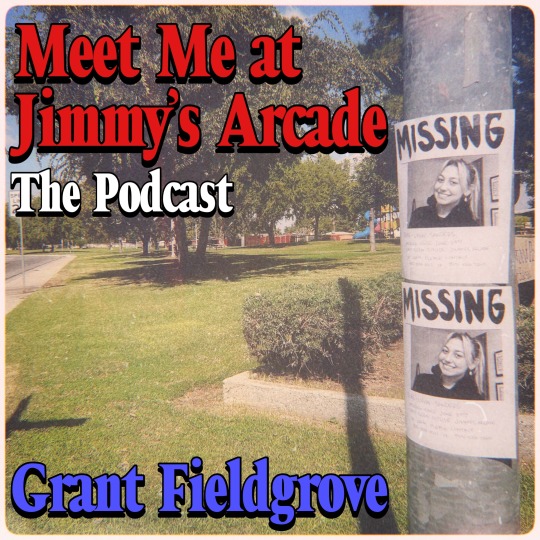
Meet Me at Jimmy's Arcade - Full Audiobook & Podcast
Audio Book
Listen to the full audiobook of Meet Me at Jimmy’s Arcade, a funny, nostalgic murder mystery and coming of age story, written and performed by me, Grant Fieldgrove. Following that, in the weeks to come, I’ll discuss a wide variety of things from the 80s and 90s. Synopsis: Bakersfield, California, 1990. Local high school student Bebe-Lynn Sanders is missing. Each day that passes causes more and more worry for the entire town. She was seen cutting through Quailwood Park on her way to rent a movie the morning she vanished. Her last appearance was later that night outside the popular hangout, Jimmy's Arcade. No one knows where she went. No one knows what happened. Join mildly-idiotic kids Grant Fieldgrove and Roxy Roxburgh as they stumble, scheme, and steamroll their way through Bakersfield in the late 80s and early 90s, desperately on the hunt for a Nintendo, fake earrings from Miller's Outpost, tickets to see Vanilla Ice at the Civic Auditorium, and the ever-elusive holy grail - a porno mag! And, of course, Bebe-Lynn. Meet Me at Jimmy's Arcade is a hilarious and heartbreaking romp through a small California town way back when, filled with nostalgic stories, humor, mystery, arcades, and malls. You won't want to miss it! So sit back, grab a Jolt Cola and a three-foot-long licorice rope, and enjoy the ride.
https://audiofiction.co.uk/show.php?id=20231229-03
RSS: https://feeds.libsyn.com/497983/rss

New Year's Day
Audio Drama
New Year's Day is a yearly fiction podcast from the team behind The Bright Sessions that comes out every January 1st. Out of the billions of human beings in the world, there are just two that share an earth-shattering secret. Charles Chambers and John Fogg are immortal; since making this discovery, they meet up every 13 years to discuss the world, their lives, and the unique challenges of living forever. It is written and directed by Lauren Shippen, starring Andrew Nowak and Briggon Snow.
https://audiofiction.co.uk/show.php?id=20240101-01
RSS: https://feeds.libsyn.com/498623/rss

Ned Hillsdale, Private Detective
Audio Book
Ned Hillsdale a hard drinking foul mouthed ex-cop turned private detective in the city of Chicago. He lives dangerously, loves intensely, and drinks harder than anyone. The very things that got him kicked off the force, now make him the citys best detective. Set against the low rumble of sad jazz and the hum of underground crime, Ned Hillsdale, is an adventure you'll want to take.
https://audiofiction.co.uk/show.php?id=20231231-01
RSS: https://feeds.megaphone.fm/ROMN5170484155

El sonido de los colores
Audio Book
Creo que los colores hablan, por eso en este podcast los vas a poder escuchar. “El sonido de los colores” es una serie de microcuentos perfectos para cerrar el día. Para frenar y decir, listo por hoy.
Acompañame en este viaje exploratorio donde le doy un significado a cada color. Cada episodio te llevará a sentir y conectarte con las características de cada tonalidad a través de historias ficticias con un alto grado de realidad. ¿Puede el verde latir? ¿El naranja ser libre? ¿El violeta explorar la valentía? Para mi, si. Soy Dani Cuppi y mi misión es sacarle gris al mundo en el que vivimos. Con estos 10 microcuentos te invito a reconciliarte, explorar y aprovechar al máximo el potencial de los colores. Cada 15 días, una nueva historia estará disponible en tu aplicación de podcast favorita.
https://audiofiction.co.uk/show.php?id=20240101-02
RSS: https://feeds.transistor.fm/el-sonido-de-los-colores
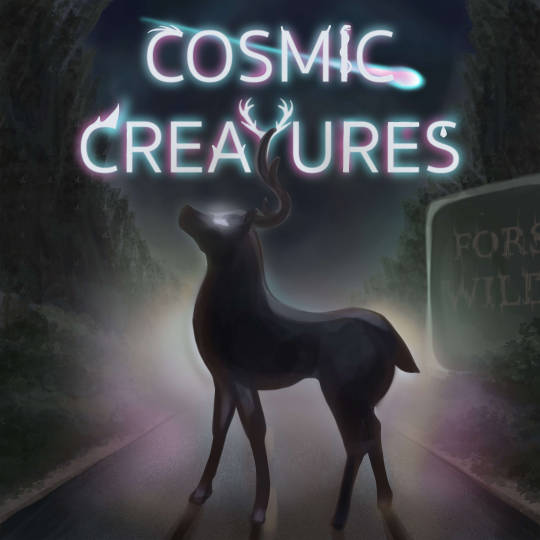
Cosmic Creatures
Audio Book
Amidst personal turmoil, science-loving teen Cale faces a life-altering challenge when an accident sets alien creatures loose in a research facility, forcing him and a group of survivors to confront both outer and inner threats.
https://audiofiction.co.uk/show.php?id=20231229-04
RSS: https://feeds.transistor.fm/cosmic-creatures
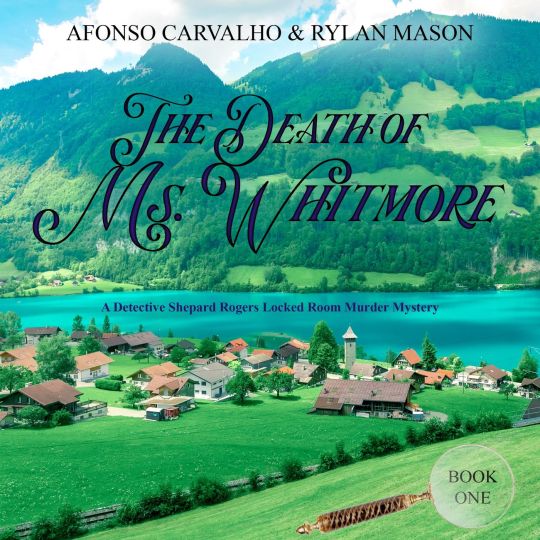
The Death of Ms. Whitmore
Audio Book
The Death of Ms. Whitmore is a locked room murder mystery.<br />Kitty is a wealthy business ower with a passion for her charity work . Her brothers dislike her and her money, due to their fathers will, the brothers have been dis-inherited from the family business. being angry that kitty is sole owner of the big house and the whole estste, even the land where their houses are on. <br />Detective Shepard rogers and his side kick Henry Adams try to solve this bizzare mystery. The study is locked, Kitty is dead, shot in the head, no gun in the room, and no way in or out.
https://audiofiction.co.uk/show.php?id=20231231-02
RSS: https://www.spreaker.com/show/6040588/episodes/feed
The Side Piece: A Serial Drama by JM Vella
Audio Book
Chase has the perfect life. A gorgeous wife, two beautiful kids, a fine house in the best neighborhood, a great job, and a sexy mistress. What could possibly go wrong?
https://audiofiction.co.uk/show.php?id=20231231-03
RSS: https://media.rss.com/the-side-piece/feed.xml
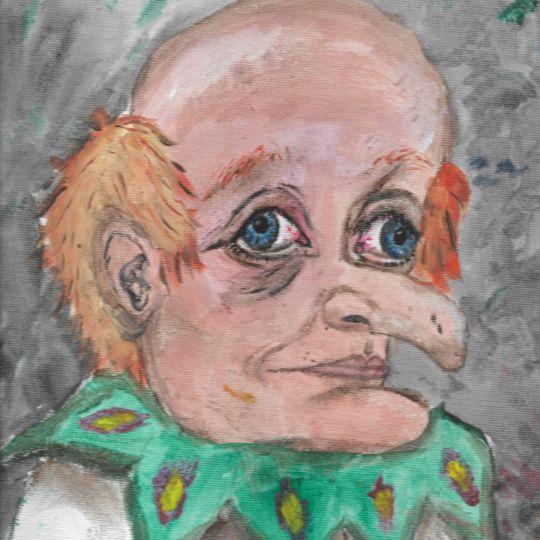
Mr Punch's Podcast
Audio Drama
Mr Punch has been around for a long time, but he's never before had his own podcast! Join Mr Punch on a series of whirlwind adventures.
https://audiofiction.co.uk/show.php?id=20240101-03
RSS: https://feeds.buzzsprout.com/2295606.rss
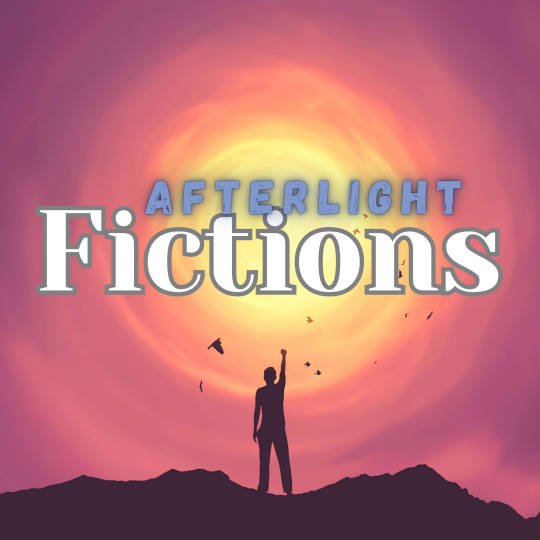
Afterlight Fictions
Audio Book
Welcome to your podcast for enjoying fables, myths and melodies from a variety of styles and genres. Stories are a mix of familiar and original works featuring music and sound effects to help immerse you in the world you're visiting. Whether you are looking for a spark in imagination, a relaxing voice to end the day, or a guide to help enter your dreamland - Afterlight Fictions is here when you need it.
https://audiofiction.co.uk/show.php?id=20240101-04
RSS: https://feeds.buzzsprout.com/1937594.rss
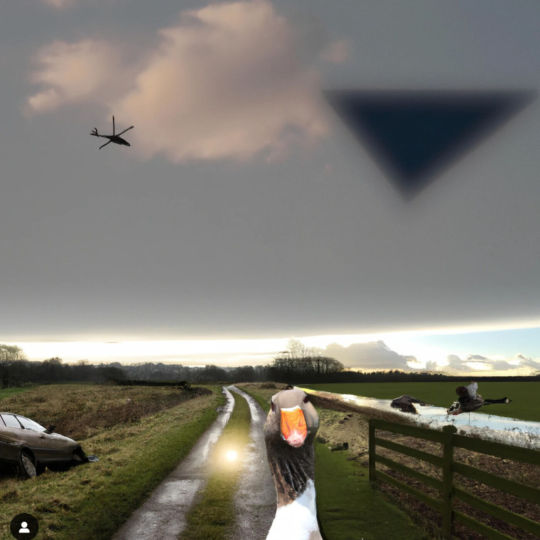
Hamlet
Audio Drama
A radio soap about life in a small village, on a small island, somewhere off the English coast. But what are those bells in the sky?
https://audiofiction.co.uk/show.php?id=20240101-05
RSS: https://feeds.buzzsprout.com/2295575.rss

1232
Audio Drama
When the experimental research of a physicist goes awry, his estranged twin children follow him through time to medieval Wales, where a shattered kingdom forces them to confront their broken relationship. Sometimes, it takes getting out of your comfort zone for God to speak to you. In the case of twins Rhona & Flint Thatcher it takes going back in time for God to get a word in edgewise. A time-travel medieval fantasy adventure for all ages. Step into a high fidelity audio epic with a full cast, narration, and an original score.
https://audiofiction.co.uk/show.php?id=20240101-06
RSS: https://feed.podbean.com/audioepic1232/feed.xml
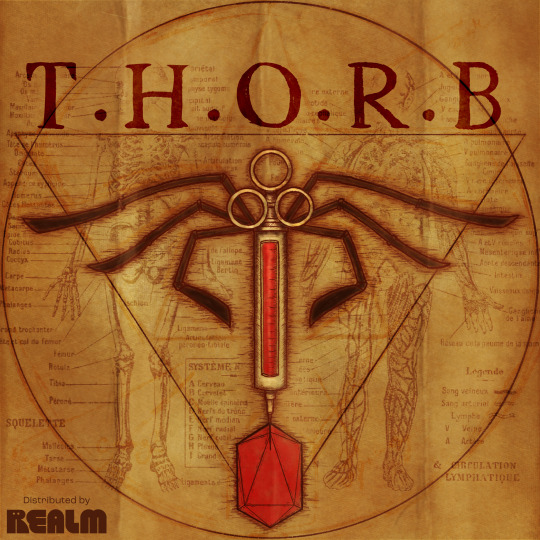
The Heresies Of Radulf Burntwine
Audio Book
Contained herein are The Heresies of Radulf Burntwine. Follow the Titular monk-turned-medical-investigator as he uncovers the blasphemous truth of a plague ridden world: ours is not a loving God and we are not its favored children.
https://audiofiction.co.uk/show.php?id=20231227-02
RSS: https://feeds.megaphone.fm/thorb

Night Owl FM
Audio Drama
A radio drama following Nick and Madelyn as they uncover and discuss the scary truths of Misty Valley and it’s citizens
https://audiofiction.co.uk/show.php?id=20231231-04
RSS: https://feed.podbean.com/nightowlfm/feed.xml

Horizon Red
Audio Drama
Life in the New Horizons colony on the surface of Mars is quiet. A small team of researchers along with ancillary security, IT, and engineers working for the private space corporation O.S.I.R.I.S. have learned to appreciate simplicity. That is, until they start to realize they might not know the whole story. Why were they really sent there? And just what isn't O.S.I.R.I.S. telling them?
https://audiofiction.co.uk/show.php?id=20231210-03
RSS: https://anchor.fm/s/eedf59b4/podcast/rss

The Time Traveler's Guide to NOT Getting Caught
Audio Book
This is the story of how I found a time traveling watch behind a dumpster and my subsequent adventures through time as I make the world a better place...for me...and sometimes for other people as well...I mean, I have no doubt other people also benefited from the changes I made, so in some ways, it's kind of the story of how I became the greatest hero of all time.
https://audiofiction.co.uk/show.php?id=20240101-07
RSS: https://anchor.fm/s/efb3d7c0/podcast/rss
1 note
·
View note
Text
CHARCTER MASTERPOST
enjoy :) hope you like this free food
i will link each character’s masterlist in this post
MOVIE MASTERLIST
STAR WARS UNIVERSE
han solo
princess leia
luke skywalker
padme amidala
anakin skywalker
obi wan kenobi
kylo ren
general hux
poe dameron
rose tico
finn
boba fett
fennec shand
din djarin
paz vizsla
cobb vanth
HARRY POTTER & FANTASTIC BEASTS
harry potter
hermione granger
ron weasley
ginny weasley
george weasley
fred weasley
charlie weasley
bill weasley
neville longbottom
oliver wood
seamus finnegan
dean thomas
cedric diggory
luna lovegood
cho chang
fleur delacour
pansy parkinson
viktor krum
voldemort/tom riddle
bellatrix lestrange
fenrir greyback
lucius malfoy
narcissa malfoy
igor karkaroff
barty crouch sr
barty crouch jr
professor severus snape
alastor moody
sirius black
remus lupin
nymphador tonks
newt scamander
theseus scamander
MARVEL & X-MEN
black widow / natasha romanov
yelena belova
hulk / bruce banner
antman / scott lang
tasm!spiderman / peter parker
hawkeye / clint barton
hawkeye / kate bishop
echo / maya lopez
kazi
nebula
daredevil / matt murdock
mobius m. mobius
deadpool / wade wilson
negasonic teenage warhead / ellie phimister
cable / nathan summers
domino / neena thurman
storm / ororo munroe
mystique / raven darkholm
wolverine / james howlett / logan
rogue / anna marie
phoenix / jean grey
cyclops / scott summers
havok / alex summers
jubilee / jubilation lee
banshee / sean cassidy
quicksilver / pietro maximoff
angel / warren worthington
x-23 / laura kinney
magik / illyana rasputina
wolfsbane / rahne sinclair
mirage / dani moonstar
nightcrawler / kurt wagner
magneto / erik lensher
please let me know which version of the x-men characters you would like me to write for when requesting
BIRDS OF PREY
harley quinn
huntress
black canary
renee montoya
victor zsasz
THE SUICIDE SQUAD (1&2)
harley quinn
rick flag
captain boomerang
polka-dot man
ratcatcher 2
bloodsport
peacemaker
LORD OF THE RINGS
merry brandybuck
pippin took
aragorn
legolas
gimli
arwen
boromir
faramir
elrond
eomer
eowyn
haldir
THE HOBBIT
bilbo baggins
thorin oakenshield
kili
fili
dwalin
THE LOST BOYS
david
marko
paul
dwayne
star
michael emerson
STAND BY ME
ace merill
denny lachance
eyeball chambers
billy tessio
TWILIGHT
carlisle cullen
esme cullen
alice cullen
jasper hale
rosalie hale
emmett cullen
edward cullen
bella swan
charlie swan
billy black
jacob black
seth clearwater
leah clearwater
paul lahote
sam uley
TELEVISION SHOW MASTERLIST
THE MAGICIANS
eliot waugh
quentin coldwater
julia wicker
alice quinn
margo hansen
penny adiyodi
kady orloff-diaz
mariana andrieski
henry fogg
fen
PENNY DREADFUL
vanessa ives
ethan chandler
dorian gray
brona croft
victor frankenstein
THE UMBRELLA ACADEMY
vanya hargreeves
klaus hargreeves
luther hargreeves
allison hargreeves
diego hargreeves
ben hargreeves
lila pitts
CHARMED (1998)
piper halliwell
pheobe halliwell
prue halliwell
paige halliwell
leo wyatt
cole turner
CHARMED (2018)
macy vaughn
mel vera
maggie vera
harry greenwood
abigael cain
niko hamada
PEAKY BLINDERS
tommy shelby
john shelby
arthur shelby
ada shelby
finn shelby
polly gray
alfie solomons
luca changretta
aberama gold
bonnie gold
johnny dogs
STRANGER THINGS
jim hopper
joyce byers
dr alexei
robin buckley
steve harrington
billy hargrove
max mayfield
NETFLIX’S DRACULA
dracula
SHAMELESS (US)
fiona gallagher
ian gallagher
carl gallagher
debbie gallagher
lip gallagher
mickey milkovich
kevin ball
veronica fisher
male!reader platonic &/or smut & fem!platonic!reader only for ian & mickey
CRIMINAL MINDS
spencer reid
penelope garcia
luke alvez
aaron hotchner
elle greenway
kate callahan
CARNIVAL ROW
rhycroft philostrate
vignette stonemass
tourmaline
GRIMM
nick burkhardt
hank griffin
captain sean renard
seargent wu
monroe
rosalee calvert
adalind schade
trubel
N0S4A2
vic mcqueen
maggie leigh
tabitha hutter
DOCTOR WHO & TORCHWOOD
9th doctor
10th doctor
11th doctor
12th doctor
13th doctor
simm!master
missy / gomez!master
dhawan!master
rose tyler
yazmin khan
river song
bill potts
nardole
captain jack harkness
toshiko sato
owen harper
MISCELLANIOUS
PEDRO PASCAL
the mandalorian / din djarin
javier pena
maxwell lord
whiskey / jack daniels
dave york
fransisco ‘catfish’ morales
marcus moreno
OSCAR ISAAC
poe dameron
nathan (ex machina)
apocalypse / en sabah nur
kane (annihilation)
gomez addams ; platonic!reader or familial!reader only
JOEL KINNAMAN
rick flag
takeshi kovacs
pete koslow
erik heller
stephen holder
ed baldwin
ANDREW GARFIELD
tasm!spiderman / peter parker
#masterlist#my writing#characters i write for#star wars#harry potter#marvel#xmen#mcu#dc#dceu#birds of prey#the suicide squad#lord of the rings#lotr#the hobbit#the lost boys#tlb#stand by me#the magicians#penny dreadful#the umbrella academy#tua#charmed#charmed reboot#peaky blinders#stranger things#dracula netflix#shameless#criminal minds#carnival row
430 notes
·
View notes
Photo

The Death Chamber, possible sketch for "Jerusalem", William Blake, c. 1800-1807, Harvard Art Museums: Drawings
Harvard Art Museums/Fogg Museum, Gift of Meta and Paul J. Sachs
Size: 16.5 x 23 cm (6 1/2 x 9 1/16 in.)
Medium: Red chalk on cream antique laid paper
https://www.harvardartmuseums.org/collections/object/296969
12 notes
·
View notes
Text
A sliver of courage and a second chance
Part 5
—-/----
“I’m worried about him.”
Jean didn’t need to be a genius to work out just who his wife meant. Another man might have felt slighted that lying in bed together, his wife’s mind was on another man; luckily for Abigail, Jean knew better. Besides, he was worried about Fogg too.
It didn’t take a genius to see that their friend was sinking into, if not melancholy, then something that looked like a hybrid between it and obsession. Where once Phileas Fogg might have spent his leisure time relaxing with his paper, some engineering periodical or planning their next adventure; this Fogg seemed to be consuming dull, heavy legal tombs with the single-minded determination of the possessed. Still, as bad as those manic episodes were, they were a million times better than the times he sat around staring into space, barely responsive.
“Me too.” Jean sighed, turning on to his side so he could at least appreciate the view of Abigail’s flushed, freckled skin, his fingertips skimming lightly down her arm, stroking the delicate skin at her wrist, before interlocking with her skilled fingers and bringing them up to his lips for a kiss.
“I think we made a mistake not telling him about Father.” Abigail pondered aloud. It had been done for the best of reasons, not to overburden their friend, but she wondered now if an alternative cause to fight might have been just the tonic Phileas needed.
“Perhaps.” Jean wasn’t sure what to do for the best.
Fogg and his problems, Abigail and her father, not to mention their own worsening situation. There was only so long their remaining coin could stretch to paying for hotel rooms and sneaking about so that they weren’t caught. Even married and with the certificate to prove it, no hotel would condescend to rent them a shared chamber, so a room each and much subterfuge was needed to snatch any time alone together.
He needed to find employment soon. Yet Jean couldn’t bear the thought of taking a servant’s position again. The necessity to live in-house would destroy any chance his marriage had. Abigail thought they should appeal to Mr Fogg, but Passepartout hadn’t yet lost his pride. He was the head of their household, he was her husband, he should be the one to support her, and not his former employer. Things hadn’t gotten that desperate, at least not yet.
“Jean, are you even listening to me?” Abigail poked at his exposed stomach, relishing the way he squirmed, her husband’s ticklishness a constant source of delightful discovery.
“Apologies, Cheri. I was distracted by your beauty.”
“Hmmm, then why were you frowning?” Abigail teased, snuggling in closer as Jean drew her back into his arms. His hands on her skin were both soothing and blissful. “Perhaps Fogg isn’t where we should start.” Abigail mused aloud. “You know how stubborn he can be.”
“Is there not a delightful English phrase about pots and kettles?” Passepartout began, only to have his wife cover his mouth with her palm.
“I am not stubborn, I am determined.” Abigail insisted, punctuating her remark by sitting up and straddling her husband, who was far from objecting by this point.
Yet as the happy couple allowed themselves to become distracted from their problems for a while, the idea persisted at the back of Abigail’s mind. There was another cat to skin.
----/----
This was the right thing to do. It was, but that didn’t make it anything less nerve wracking. The weather wasn’t helping, as Abigail shuddered under her umbrella, already out long enough in the dirge of London weather for the rain to soak into her hemline. It had taken her long enough just to find the right address, and now she was here prevaricating.
Taking a deep breath, Abigail walked up to the respectable front door, in the poorer but still respectable neighbourhood, and knocked. A few moments later the door was opened by a silver haired, apron wearing matron, whose rolled-up sleeves indicated some strenuous housework had just been interrupted.
“Yes?”
“Apologies for calling so early, but I was hoping Mrs Rossi was still at home?”
Eyes narrowed as she took in Abigail’s well-cut clothing and earnest face. It took a moment before the matron answered. “Aye, she’s at home.”
“May I see her?” Abigail prodded when it looked like she was about to be turned away.
“Well, that depends if you are with that other fellow or not?” At Estella’s confused expression, she added. “Pompous blowhard of a man, coming here making threats. The poor woman doesn’t need any more of that, what with everything else she is going through.”
For a moment, Abigail panicked. She was here on behalf of a man, but making threats didn’t sound like Mr Fogg at all.
“No, actually I am here to apologise for something I did.” It was the truth, after all. That was the main reason for her visit, persuading Estella to call on Phileas and repair the rift she started, well that was something she could only hope for.
“Well in that case.” Satisfied that Abigail was little threat, the door was opened, and Abigail gratefully stepped into the warm and dry hallway.
“Oh, I am so sorry.” She muttered as her folded up umbrella left a puddle of water on the pristine tiled floor.
“Never mind that. You’re not responsible for the weather. A cup of tea wouldn’t hurt, though. I imagine you are cold to your bones.”
“Oh yes, that would be wonderful.” Abigail smiled genuinely at that offer. It had been an age since her tea at breakfast, and she happily followed along down the stairs into the basement kitchen, where to her surprise, an apron clad Estella was busily pounding her fists into some dough.
“Visitor for you Estella.”
Freezing in the doorway, Abigail tried her best to not quail under the look Estella shot her.
“Miss Fix…apologies I don’t recall your married name. I am somewhat astonished to see you here. I cannot imagine that we have any left to say to one another.”
“Passepartout…That’s my married name.” Abigail felt her throat go suddenly dry. Despite the warmth from the stove, she suddenly felt quite cold. “And I came because I owe you a proper apology.”
For a moment, it looked like Estella would refuse her, yet the strictures of an upper-class education had not completely lost their grip on the former debutante.
“If you give me a moment to right myself, we can have tea in the front parlour.”
Back up the stairs and into the formal sitting room, there was no fire in the grate, as callers had not been expected on such a damp, desolate morning.
Apron removed, and cuffs buttoned, Estella joined her not five minutes later, setting a tray with what was clearly the good china teapot and teacups down on the table. The familiar rituals of tea making were observed, questions of milk and sugar, politely asked and answered. Until it was just the two of them face to face, armchair to armchair, the battleground of a polite morning call before them; a battlefield Abigail had never once felt comfortable in.
“Do you think whilst I am here, we can drop the polite niceties?” Abigail all but blurted out. The prospect of polite enquiries about her husband’s health and discussion of the weather only contributed to her nervousness.
“Straight to the point, I can respect that.” Estella lost a little of her rigidness, relaxing from the perfect posture that had been drilled into her since girlhood, into the more adapted lowering of her shoulders and leaning back into the comfort of the chair cushion that had typified her New York lifestyle.
“So, Madam Passepartout, since we are being blunt, I very much doubt there is anything you can say that I particularly want to hear.”
“No, I doubt there is. How could anything I have to say make right the wrong I have caused you and a very dear friend?” Abigail answered honestly. “I knew it was a mistake, writing that article the moment I realised I dreaded Mr Fogg reading it. I was so caught up at first in the romance of it all, of finally having an answer that made more sense than some silly bet. He was such a puzzle, you see. All bluster and English nonsense one moment, then just shy of genius the next.”
“Yes, Phileas has never performed well to strangers.” Estella added with a sip of her tea. “Even as a much younger man, he would hide his real thoughts and feelings behind the mask of an English gentleman.”
“Yes exactly. I couldn’t make sense of it, neither could Jean. Then he fell ill in India, delirious even, he thought you were there, that’s how I found out you existed…it wasn’t that Mr Fogg spilt all his secrets to us, it was an accident, one I should never have taken advantage of the way I did. It was so selfish of me to take inspiration from his pain…your pain.” Abigail paused, for a moment reliving the look of betrayal in Fogg’s eyes when he first read that article.
“I don’t think he would ever have forgiven me after Hong Kong, if it hadn’t been for all that business with the prison and his flogging; not to mention getting forced off an ocean liner at gun point…I suppose that tends to put things into perspective…” Abigail trailed off, finally lifting her gaze and catching the look of complete horror on Estella’s face.
“He was flogged?” The very idea of Phileas being hurt in such a barbaric manner it sent her mind reeling.
“Oh, it wasn’t his fault.” Abigail insisted, grasping for the wrong explanation. “It was all a terrible case of mistaken identity, really.”
“Of course it would be. Phileas would never, could never, do something worthy of such a punishment. And who on earth forces anyone off an ocean liner?”
“I think perhaps you had better ask Mr Fogg about that. I suspect he knows far more about Mr Kneedling than he has told either Jean or I.”
For a moment, Estella almost retorted that she would get to the bottom of it, but then she remembered her resolution to let Phileas move on with his new life.
“I think it would help to have someone else to talk to about it. He struggles with us I think because he feels so guilty for putting us in harm's way. He blames himself for everything, even things out of his control.”
“Yes,” Estella whispered into her teacup, in that Phileas had not changed.
“He’s doing it now as well. Blaming himself. He won’t tell us what is wrong, but he’s barely left his library in days. I confess I had a secondary motive for coming here today. I was hoping you would help me with him. I am worried he is going to make himself ill.”
“I don’t know how I would be any help?” Estella insisted, setting down her teacup and fussing with refreshing both their cups.
“I thought we were talking bluntly today?” Abigail knew she was pushing her luck, she knew it by the sharp glare that Estella shot her, by the way she got to her feet as if longing to show her the door.
“If we are being blunt, Madam Passepartout, then let me be equally candid. I don’t like you, and I don’t forgive you for exposing a painful part of my past to ridicule, just so you and your father could sell some more copies of that dratted paper of his. I may have been a mysterious lost love to you, but my former peers and your own father knew exactly who I was. To have my heartache be laughed at in drawing rooms all over London. I was a ghost that should have stayed buried. I imagine both Phileas and I would have been much happier that way!”
“I don’t believe that for a second, at least not on his part. I have never seen a man so devoted as Phileas Fogg, and you punishing him because of me…"
“This isn’t all about you!” Estella snapped, her control on her emotions lost. They were barely tethered on the best of days, and this was not the best of days. “They took my son, my only child away from me, and I am doing everything in my power to get him back, short of selling myself into marriage with that snake Bellamy to do so…”
“Bellamy? Fogg’s Bellamy?” Abigail was confused.
“How many other monsters called Bellamy do you suppose haunt the streets of Mayfair?” Estella retorted, collapsing back into her chair and into herself. “Phileas promised to help, but what can he do? He doesn’t have any powerful friends, not like my father does. They want me to just sit and wait, but how can any mother just sit and wait while anything could be happening to their child?”
“Of course you couldn’t.”
It was all starting to make sense now, Fogg’s obsessive behaviour, Estella’s emotional reactions, and she and Jean had blundered right into the middle of it all.
“I am going to help. In whatever way, I can help you. I will find a way.” Abigail insisted, earning a wry chuckle from the woman next to her.
“How can you possibly help me?”
“I am good at finding things out, and Jean is good at getting into places he shouldn’t, and Mr Fogg is practically a genius. Between us, we can solve anything.”
Estella was almost amused by her certainty. To be that young and to have that faith that everything would work out alright in the end. Estella had lost that faith about a month into her stay in Paris, when she had finally given up hope Phileas would ever follow her.
“You would be better off keeping out of the whole business. I told Phileas much the same…”
“And he hasn’t taken any notice either.” Abigail insisted. “Why else would he be trying to become an expert in the law all of a sudden?”
“He..he is?” Estella couldn’t believe it. Even after all the cruel things she had said to deter him, Phileas was still trying to help her. Help in the only way he knew how. That knowledge thawed something inside her, something that had been growing hard and bitter.
Whatever else Estella might have said, it was cut off by the sudden thunderous knocking on the front door, and the muttered complaints of the matron of the house as she rushed to answer it. A moment later, the front parlour door was flung open, and an opened note pressed into Estella’s hand.
“It’s happened. He’s dead.”
“You’re certain?” The look of relief and joy transformed Estella’s face as she stared down at the scribbled note.
“I worked with Fanny Wilcox for fifteen years until your mother passed Estella. She’s been housekeeper there for the last ten. Nothing happens in that house without her knowing about it. If she says he’s dead, then the old goat is dead!”
Flinging their arms about one another, there were happy laughter and tears, until a suddenly energised Estella suddenly started casting about for her hat and coat.
“I will have to go retrieve Davide at once. I won’t have him staying in that house a second longer. Hang the money.”
“Just be careful, my girl.”
“Oh Helen, it is all going to be alright now. He can’t punish me anymore.” Estella insisted before turning back to a confused Abigail. “It seems I won’t be needing to take you up on your offer, Madam Passepartout.”
“I am very happy for you, and I know Mr Fogg will be relieved, but you really shouldn’t go alone. Let me accompany you at least, if I can do nothing else?”
“If you like.” Estella hardly cared. She was going to get her son back. Everything was going to be alright now.
Gathering her things Abigail, hurried to match Estella’s frantic pace. Perhaps it was simply the grim weather making her pessimistic, but as they stepped out into the drizzle and hurried through the streets, Abigail couldn’t help the curdling feeling in her stomach; it really couldn’t be that simple? With Bellamy involved? Things were never that simple.
—-/—-
4 notes
·
View notes
Photo

Religious Agencies, Salvation Army: Germany. Salvation Army Work with Women: Salvation Army: Germany: Work with Women.: Chamber in the Metropole, girls' lodging house, Berlin., Unidentified Artist, c. 1903, Harvard Art Museums: Photographs
Harvard Art Museums/Fogg Museum, Transfer from the Carpenter Center for the Visual Arts, Social Museum Collection
Size: image: 14.7 x 11 cm (5 13/16 x 4 5/16 in.)
https://www.harvardartmuseums.org/collections/object/6620
5 notes
·
View notes
Text

obsessed with this shout-out in Bobby's Snacks newsletter that compares New Year’s Day to The Portrait of Dorian Gray and The Prestige, those are the vibes exactly
45 notes
·
View notes
Text
May 30th, 1919
Somehow, I have found myself a fifty-five year old man. While I have had either the good fortune or the misfortune (all these years on and I’m still uncertain which it is) to avoid the ravages of age, my mind is that of a person who has been on this earth for five decades and seen a nearly world-ending war. One would think that these experiences would bring wisdom with them, but that remains to be seen. All I know I’ve gained is a kind of weariness that reminds me of being a boy, but now without any of those hardships.
To think of that boy now brings no small amount of relief, a bit of awe, and a certain measure of grief. My life is inarguably better than it was and yet, I have no sense of who I am really am. Perhaps it is the lack of possibility—when you are a young, the future stretches before you like an endless road. And then, over the years, you get set in your ways, your thinking, your very being. You become limited by your own experiences, perspectives, and, for most, your physical form.
I see it in my colleagues—those I still correspond with, too worried about the consequences of seeing any of them in person. They write of how they wish they could go adventuring as they always have but their heart or their bad leg won’t let them. Even John has sometimes spoken of how his leg and hip bother him, slow him down, though he talks of it as a mere inconvenience and nothing more. I try to be compassionate and understanding in my responses, though I always have to take special care writing him back on the subject, for every time I think of him immediately coming into mortal danger when arriving at the front, a kind of furious anger fills me, the likes of which I have not felt before. It embarrasses me, to still be so easily riled by the events of a war already being written about in history books, but everything with John always did provoke me faster than anything else.
I have yet to see him in person—travel still limited in the way that it is—but I fear he will try to hide from me the more serious ways in which his injuries affect him. He certainly went through a considerable amount of effort to hide the incident from me in the first place, always skating past my questions in his letters and having me write, not to the infirmary, but the neighboring town. In any event, the burns did not seem to slow him down too much during the war, considering he was right back out there far sooner than I would have preferred. I suppose I should just be grateful we’re both alive—I am grateful, deeply. But it irks me to think of him in pain or distress.
But all of that is old news at this point—I fear that he and I will discuss matters ad nauseam if we both refuse to move on. Neither one of us is very good at backing down from a fight.
Perhaps I am fixating on others’ troubles because I have so few of my own. I am certainly not resource limited. Especially since I began playing my luck on the stock market, the wealth that I have is practically unthinkable. It certainly would have been beyond the imagination of the boy who hawked newspapers on street corners to support his mother.
What would he think of me now? He would be glad, I think, to be out of the grips of poverty and equally astounded at that fact. But would he be disappointed in my fairly sedate life? Would he be horrified at my loneliness?
For all their struggles—learning a new language in adulthood, being so far from their homeland, even if there was nothing left for them in Ireland—for all the ways in which my parents were impoverished, they were never poor in company. Two people so in love they crossed the ocean with only the other to talk to; who had a child to enrich their life, not fill it; who made a warm and loving home out of a one-room tenement in the middle of a strange nation—these were not people who were lonely. It hurts to think of how they would have grown together as they aged, of the way their love would have deepened if father had never died. Perhaps mother would have been more inclined to travel, less afraid to stray too far from her husband’s grave for too long. Maybe her vibrancy and sharp mind would not have withered on the vine, the way I’ve no doubt father’s would have if she had been the one to an early grave. I never would have been company enough for either of them. No child could have filled that hole of grief.
Which is why I can never take a wife, nor have a child. It pains me—a sword in the soft spot of my chest—but there is nothing for it. Despite the fact that I’m sure I could find one—while I may not be much to look at, especially off stage, I am rich and, as far as anyone knows, of good stock and name. The myth of Charles Chambers has become so complete that no one remembers he appeared from thin air like one of his illusions. Charlie Coughlin, for them, was never alive.
So, yes, I could get a wife with ease—one who would, no doubt, be beautiful and clever and eager to start a family. Perhaps I could even contrive some kind of disguise to age with her, tell the children the truth when they are older. But I would have to watch them march off to the afterlife as well, and I’m not sure I could bear it. I’m not sure I could bear getting married—even without children—only to have to do it all over again with the same lies and secrets. When I fall in love—if I fell in love—I suspect it would be forever.
I have yet to discuss these matters with the one other person who understands, but how am I meant to write to John and ask his intentions toward marriage? I’m sure if he has eyes on someone, he’ll tell me when he means to propose. Or perhaps I will read about it in the papers like everyone else.
I know it is improper—immoral even, in some eyes—to think of such things, but even as a young man I thought that John was a striking—[the rest of the paragraph is crossed out so completely as to be unreadable]
It is best not to put it to paper, even here in the privacy of my diary. There is no point to such stray fantasies thoughts anyway.
I have forgotten father’s face. I had a photograph taken of mother and I before she passed but I can no longer conjure the feeling of her hand in mine nor the sound of her voice. Every friend or colleague I’ve ever known will someday fade from memory, or has already, vanishing like morning mist in the heat of the day.
Now, the face I see most clearly when I close my eyes is John’s. And his face, like my own, is ever unchanging.
[from the personal diary of C.X. Chambers]
[listen to New Year’s Day wherever you get your podcasts. to read the pre-1917 entries, join atypical artists and get access to the archive of 24 entries (5,000+ words), as well as ad-free episodes. to receive future monthly missives straight to your inbox, sign up for free here]
15 notes
·
View notes
Photo

Study for the Figure of Fortune in "The Discoverer" Fresco, Assembly Chamber, State Capitol, Albany, New York, William Morris Hunt, 1878, Harvard Art Museums: Drawings
Harvard Art Museums/Fogg Museum, Gift of Meta and Paul J. Sachs
Size: sight: 94 x 62.5 cm (37 x 24 5/8 in.)
Medium: Charcoal on buff wove paper
https://www.harvardartmuseums.org/collections/object/308226
2 notes
·
View notes
Photo

Saint Jerome in a Dark Chamber, Rembrandt Harmensz. van Rijn, 1642, Harvard Art Museums: Prints
Harvard Art Museums/Fogg Museum, Gift of William Gray from the collection of Francis Calley Gray
Size: sheet: 14.8 x 17.5 cm (5 13/16 x 6 7/8 in.)
Medium: Etching and engraving on white antique laid paper
https://www.harvardartmuseums.org/collections/object/279627
30 notes
·
View notes
Text
The Work of Art in the Age of Virtual Reproduction
By Stephen Narain
This essay received the 2014 Alice Yard Prize for Art Writing.
We were kids without fathers, so we found our fathers on wax and on the streets and in history, and in a way, that was a gift. We got to pick and choose the ancestors who would inspire the world we were going to make for ourselves.
—Jay-Z, Decoded
I, therefore, invite you to consider, as a suggestive analogy, the action which takes place when a bit of finely filiated platinum is introduced into a chamber containing oxygen and sulphur dioxide.
—T.S. Eliot, “Tradition and the Individual Talent”

“Cut” by Kara Walker (1998)
1. The Disintegrating Sugar Sphinx
This essay is about not seeing the physical exhibit of Kara Walker’s “A Subtlety.” This essay is about seeing hundreds of its virtual reproductions online.
I first encountered Walker’s work in 2007 at Harvard’s Fogg Art Museum. At the time, I was an undergraduate preparing to tell my parents—Guyanese immigrants to the United States—that, no, I would not be applying to law school. I wanted to become a writer. Still, my family’s pragmatism shaped the vision of the writer I wished to become. Socially conscious. Committed to a community’s particular experiences. Unafraid of upsetting that community’s standards if necessary. I had big ideas about the novel and about what the novel could do. Yet, I was also aware that the bridge between aesthetics and politics was a difficult one to build. Add to this the sophomore’s struggle with interpretation. A discerning professor during a course on the American counterculture of the 1960s encouraged me to constantly examine the assumptions guiding my claims about the political uses of art. Such proclamations might best be made after a more nuanced study, she suggested more than once in red ink on my C- papers. My response in the months to follow was to run in the opposite direction of grandeur: to read so minutely that I could never be charged of falling prey to the affective fallacy. The ideal criticism, W.K. Wimsatt and Monroe Beardsley wrote in 1949, “will not talk of tears, prickles, or other physiological symptoms, of feeling angry, joyful, hot, cold, or intense, or of vaguer states of emotional disturbance, but of shades of distinction and relation between objects and emotion.” I might as well have tattooed that quotation on my arm. I don’t think I laughed or cried my entire senior year.
Viewing Walker’s exhibit, which included silhouettes of slaves superimposed on lithographic renderings of Civil War battle scenes, I tried to remain as “objective” as possible. But a slave’s decapitated head was floating in a cloudy sky. Blobs that could either be blood or feces were nestled in a valley. Entire appendages were flung into the lithograph’s white borders, beyond the image entirely. I tried to be subtle when what I felt was disgust. What was the nature of this disgust?, I wondered. And how do I ensure my response to it became neither parade nor parody? How do I neither scream the near-platitudes of Amiri Baraka nor dwell in the ignorance of those people privileged enough to proclaim “art for art’s sake?”
Writing on her visceral response to E.M. Forster’s A Room With A View, Zadie Smith suggests: “We are aware that there is an emotive response for which the novel explicitly applies that is not properly requested by an atom or a rock formation or a chemical compound. Sensing the anomalous nature of this emotive quality within the university, we have resolved not to speak of it much.” My gut emotive response upon seeing Walker’s modified lithographs was a sense that they were gesturing toward the stories that remained hidden within my family, within my country, within the region I choose to call home. Walker’s pieces were the most brilliant evocations of historical revisionism I had ever encountered. The vital differences between American and Caribbean slavery aside, I wondered how my particular experiences as a West Indian person related to those “objective” criticisms I was tasked to make in the classroom. Was I supposed to suppress these experiences? Channel them in some measured, productive—and ultimately palatable—way? What, in the name of “nuance,” might I elide? And those basic facts of biography—a Bahamian childhood, a father who grew up on a Corentyne farm, Indian ancestors who crossed the kala pani many generations ago—what became of them?
Seven years later, I still have not answered these questions. (I might spend a lifetime as a writer trying to do so.) I follow Walker chiefly because her work encourages me to not only examine my assumptions about the political uses of art as Sullivan instructed—but to constantly examine the professor’s assumptions as well. I was sad when I arrived in New York a week too late to see Walker’s thirty-five-foot-tall sugar sphinx, but I was grateful that I could experience her work the way most young people living in the world experience things these days. I scrolled through hundreds of photographs posted on the Instagram and Twitter and Facebook pages of people I did not know. Things got complicated, however, whenever I clicked the hashtag #karawalkerdomino. Disturbing images loaded on my screen—the skinny boy sitting next to me at the coffeehouse might have assumed I was interested in some strange pornography. “Sowapowa” angles her camera to make it look as if she were squeezing the sphinx’s impressive areolas. “Bulzeye”—in an unfortunate accident of nomenclature—inserts his tongue into the sphinx’s vagina. “Nealmaffei” smirks beneath the sphinx’s derrière.

The virtual fourth wall demolished, I wonder how Wimsatt and Beardsley might react to the Brechtian theater that art-viewing has become on social media. I wonder what they might make of the constant bombardment of images we encounter where individuals have inserted themselves into the text. I wonder what they might make of Kara Walker.
This essay poses—and refuses to answer—questions about the nature, production, and consumption of art in this current age of virtual reproduction. It is written by a Guyanese-Bahamian-American person three days after he faced the Domino Sugar Factory for the first time, holding a fancy camera his great-grandfather could never afford, preoccupied not by the onus of history, but by all the aggressive facial hair to be found in Williamsburg, Brooklyn. A photograph is stored in his imagination. In it, a forty-year-old hipster with a handlebar moustache stands in front of an artisanal cheese shop. A young orthodox Jew—hat black, locks brushing against his ears—holds his son’s hand.
They are all waiting for the light to turn green.
2. Good Selfies/Bad Selfies
“The photograph,” Roland Barthes writes in Camera Lucida, “represents that very subtle moment when, to tell the truth, I am neither subject nor object but a subject who feels he is becoming an object: I then experience a micro-version of death (of parenthesis): I am truly becoming a specter.” With each social media post, we experience the ghosts of our previous selves. For a Caribbean community that has had its identity reduced for centuries, this layering of character can provide a powerful tool for cultural change. Frequently, the region’s social evolution has been framed in postcolonial language, and I wonder if changes in media consumption might serve as a viable alternative—or complement—to these critical constructions.
In his 1956 novel The Lonely Londoners, Samuel Selvon paints a portrait of a balkanized metropolis. “It have people living in London,” Selvon writes in the inimitable voice of Moses Aloetta, “who don’t know what happening in the room next to them, far more the street, or how other people living. London is a place like that. It divide up in little worlds, and you stay in the world you belong to and you don’t know anything about what happening to the other ones except what you read in the papers.” Newspapers, in the past quarter century, however, have radically evolved in their platform: when was the last time you sat down with a hardcopy of The New York Times or the Trinidad Guardian or the Stabroek News? Moses’ nostalgia in Londoners is fed by his physical distance from Port of Spain—but in a visual sense, his nostalgia is fed by his distance from real images of the city. If nostalgia is built from a triangular interaction between memory, desire, and sensation, the Internet has radically transformed how we remember, want, and feel.
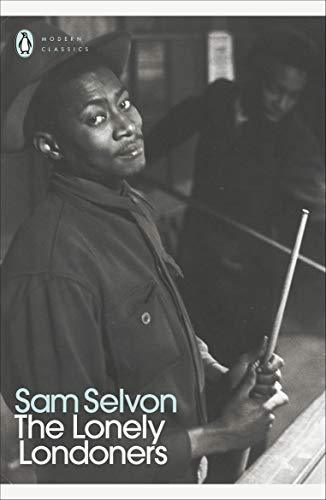
The post-independence generation of artists emerging from the Caribbean and its diaspora are hyperaware in narrative effect—if not in poetic intent—of this cultural tide change. Christian Campbell, in his poem “Lightskinned Id,” takes a joy in the simultaneity of his skin’s multiple shades—and in what effect such a coexistence might have on the evolution of his perceptions. In “Disappearing Houses,” a collaborative project published in the Summer 2013 issue of Wasafiri, Andre Bagoo and Vahni Capildeo employ photometric techniques to disrupt our often vision of Trinidad’s economic progress. They create otherworldly images of working-class detritus in tension with the vision of glass and steel development promoted by tourist boards and self-fulfilling prophecies. The works of Shivanee Ramlochan, a journalist, poet, and editor, and Danielle Boodoo-Fortuné, a painter and poet, are preoccupied with the spiritual shape-shifting we might trace back to Hindu mythology.
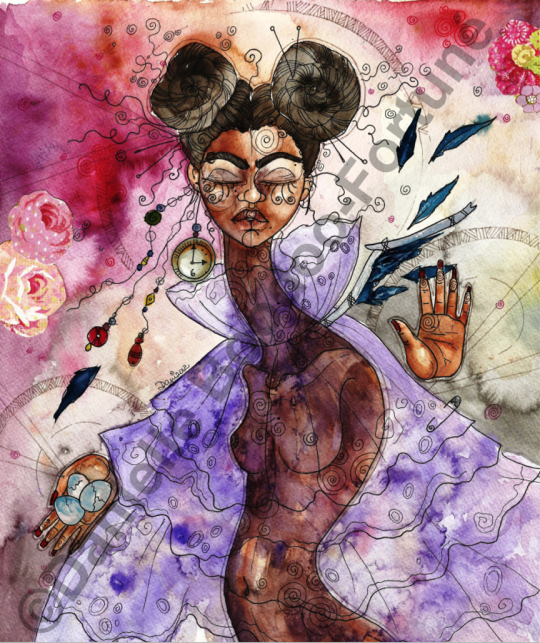
Boodoo-Fortuné, influenced by Frida Kahlo, works in watercolor and ink. Her exhibit “Criatura”—Spanish for “creature”—ran last summer at the Art Society of Trinidad and Tobago. The forty-four pieces, the artist writes, were intended to “prompt reflections on the alchemy that governs a mixing of selves, straddling life and death, their natures fed by forces of both fruition and decay.” The title piece portrays a woman, part human, part tree. Wildflowers grow from her hair. Her elongated neck is composed of skin and bark. Her eyes are exaggerated like an anime temptress, yet sadness resides behind seduction. This balance of boldness and vulnerability marks Boodoo-Fortuné’s representations of the feminine spirit. Each of the painting’s women can be interpreted as conversing with one another. But this observer wonders if the piece “Separate and Same” provides a key to understanding the exhibit as a whole. Might all the women in Boodoo-Fortuné’s collection reside in a single body, the way Parvati and Durga and Kali belong to one entity? Is Boodoo-Fortuné’s collection a yoga of sorts? And if so, is a walk through the gallery akin to clicking through a friend’s Facebook album—that peculiarly twenty-first-century mythopoesis—titled “2013 was a great year!”? Image one: a kiss on a mountaintop. Followed by a stare behind a glass of Cabernet. Wisps of hear behind a commencement cap. A contemplative look into nowhere. Then a click. A true nowhere. A white space. Until we choose to close the page, to log off, and to get on with our ordinary lives.
3. A Brief Note on Danielle Boodoo-Fortuné’s Tumblr Page
The title of Boodoo-Fortuné’s Tumblr page, “Wings & Fire,” further signals the artist’s fascination with flight and destruction, with hubris and humility, with Icarus and Daedalus. My interpretation of Boodoo-Fortuné’s work fundamentally changes because I follow her on Tumblr. Below one of “Criatura’s” paintings, “Mother of the Hummingbirds,” is a quote by Sandra Cisneros: “I am obsessed with becoming a woman comfortable in her skin (via radicalheart82), 16,625 notes.” On June 20, Boodoo-Fortuné posted an animation of a turtle with a Band-Aid on its shell. The caption: “Don’t knock my shell. It hurts a lot.” Two weeks prior, Boodoo-Fortuné posts a picture of puppy prints in her studio floor. A week before, a statue of a lady grasping wilted flowers. The same day: what looks like mortar and pestle and ferns on a woodblock. That same day again: a GIF of a woman like a 1960s Elizabeth Taylor with a halo over her crown, an image of the sun eclipsing the moon, and moving constellations, dippers—big and small—Orion, Hercules, all these stars I cannot name.
4. Anatomizing Self Construction
If Boodoo-Fortuné’s gallery exhibition represents an endpoint—and epiphany—her Tumblr page provides a glimpse into the rough work behind the artist’s elegant proofs. This is a very modernist sensibility, something I can only now articulate in this manner, in this moment because of the discerning professor allergic to bullshit. A scholar of T.S. Eliot, Ezra Pound, and James Joyce, the professor helped me realize that the works—The Waste Land, The Cantos, Ulysses—I romanticized as spontaneous acts of genius experienced passionate revisions by their respective their editors. These works were not created in isolation. They were the product of many hands.
“What happens when a new work of art is created,” Eliot writes in his essay “Tradition and the Individual Talent,” “is something that happens simultaneously to all the works of art which preceded it. The existing monuments form an ideal order among themselves, which is modified by the introduction of the new (the really new) work of art among them.” In our current age of virtual reproduction, Caribbean artists frequently—and subconsciously—shuffle inherited sequences. The texture of old ideals is constantly impacted by the Caribbean artist’s engagement with, or negation of, those ideals and by her reifications of historically marginalized forms, be they of griot storytelling traditions or of the aesthetics of creolization or of the Walcottian mythology-mixing created within the region’s social web.
Through Tumblr’s interface—consisting of patterned visual displays, a dated archive, and a dynamic social network—we can glimpse, in unprecedented ways, the versions of the Caribbean artist’s self she wishes to represent to the world. Boodoo-Fortuné’s Tumblr page reveals a deep interest in gender roles, in spirituality, in the factors that facilitate—and hinder—empathy with fellow human beings and with nature. We see the influences she wishes us to see. Insodoing, we also see the content of each influence differently. We see Cisneros in relation to Boodoo-Fortuné’s “Mother of Hummingbirds.” We see bruised turtles in relation to Boodoo-Fortuné’s “Mother of Hummingbirds.” We see the stars in relation to Boodoo-Fortuné’s “Mother of Humingbirds.” And somewhere along the way, our perceptions are altered, our foci shift. The life of a hummingbird’s mother becomes foregrounded in our minds. What might that life entail? And I think back to Walker’s Civil War lithographs. I think of Toni Morrison’s Sethe.
“Every negro walk in a circle,” Marlon James writes in The Book of Night Women. “Take that and make of it what you will.”
5. Bridging the Uncanny Valley
Right eyebrow arched against social media, Smith writes in her essay “Generation Why?”: “When a human being becomes a set of data on a website like Facebook, he or she is reduced. Everything shrinks. Individual character. Friendships. Language. Sensibility. In a way, it’s a transcendent experience: we lose our bodies, our messy feelings, our desires, our fears.” Yet, the impulse to acquire multivalent information is precisely what drives many Caribbean users to social media in the first place. It’s difficult to deny that Facebook inspires narcissism (it’s called “Facebook”) or Instagram, idiocy (young man licking the vulva of a sugar sphinx). But this generation’s online capacity to curate their visual representation—individuals actively insert themselves into dominant images, if they wish—facilitates a freedom denied to many individuals in the colonized Caribbean.
I won’t risk grandeur by arguing that Facebook feeds political independence, but I wonder how the Arab Spring might have turned out if millions of people took Smith’s skeptical route. She is correct on this point, however: the Internet user loses himself in the social network’s vast garden of forking paths. The pornography addict, the terrorist recruiter, the pro-democracy activist: all of them transcend their physical selves online, becoming the “set of data” points they wish to project to the world.
Two of the most promising voices in Bahamian culture—the novelist A.L. Major and the academic Angelique Nixon—both engage with the ways in which the expectations of the tourism industry have impacted, for good and for ill, the prism through which Bahamian people view their history and themselves. “When colonialists discovered the islands,” Major writes in a Michigan Quarterly Review blog post “Going to Watch Junkanoo,” “they found a way to instantly categorize those areas, a way to describe and recognize the islands easily. Tropical birds, exotic fruits become the recognizable features of a tropical landscape, and not, for example, poorly maintained roads or overburdened garbage collection sites. It’s this brochure self-knowledge, an ability to see the world as tourists might, that stifles creativity.”
Uncovering the garbage, for Major and for other post-independence Caribbean thinkers becomes a call to action, even as—for the sake of propriety and tourism advertisements—many Bahamian citizens might want to keep these images concealed. Yet one can’t help but feel that figures such as Major and Nixon take an end-justifies-the-means approach to criticism: in their ethical cost/benefit analysis, their people’s self-understanding far outweighs a Norwegian tourist’s ability to enjoy her suntan.
If Major uses a literary magazine’s blog to interrogate the images coming in and out of the region, the Barbadian photographer Risée Chaderton uses a TED talk to interrogate how such images, in real ways, impact the Caribbean body politic. In “Shaping Who We Are,” Chaderton discusses the rise of eating disorders amongst Caribbean men and women. She studies the “uncanny valley”—a perceptual space where non-human images appear to be human. Near the cusp of this valley might be robots or Disney characters—as well as many of the models on the covers of style magazines that make their way into Caribbean dental offices and public libraries and teenage bedrooms. Chaderton’s photographs, committed to celebrating healthy Caribbean body images, necessarily oppose the images that fall within the uncanny valley, just as Major’s blog opens a space for Bahamians—and non-Bahamians—to interrogate the assumptions guiding the country’s history-writing.
youtube
What artists like Chaderton—and Walker and Boodoo-Fortuné—encourage is a radical reconception of the Caribbean female body, a site that has been abused, distorted, and commodified for much of the region’s history. Understandably, these artists’ work is in constant battle with the sheer force of incoming images from international media. However, the intimacy of these artists’ visions allows us to anatomize self-construction—physically and spiritually—in the tradition of Janine Antoni, Paule Marshall, and Jamaica Kincaid, three of the most innovative Caribbean artists of the twentieth century. As Walker’s giant sugar sphinx appears lower and lower on the public’s collective Instagram feed, I wonder how these artists’ work will evolve in the years to come. I wonder what their art (and their tweets) might teach us about who they are individually becoming—and about what the Caribbean, as both a region and a sensibility, seeks to represent down all its plural avenues.
3 notes
·
View notes